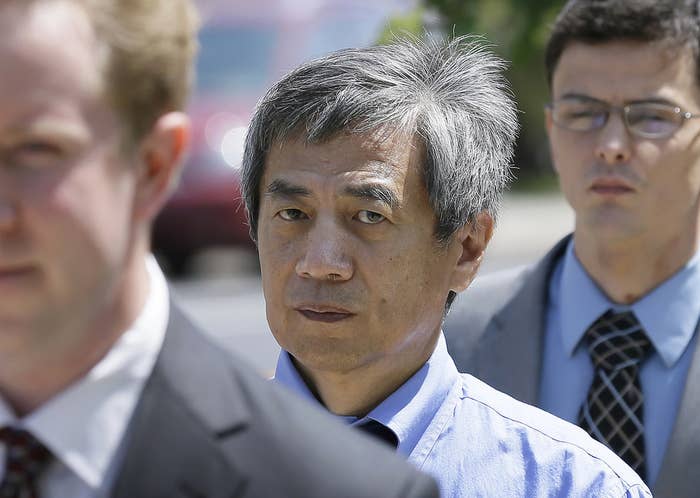
On Wednesday, ex–Iowa State University scientist Dong-Pyou Han was sentenced to four years and nine months in prison for faking AIDS research using roughly $11.6 million in government funds.
Han has also been ordered to pay back more than $7.2 million in misused funds to the National Institutes of Health, though it's unclear how and whether he will obtain the money to do so.
"It is important that we stand up not just for punishing the fraud committed against the United States government, but for the research that should be legitimately taking place on this devastating disease," said U.S. Attorney Nicholas Klinefeld in a statement released by the Department of Justice.
Han is one of just a handful of scientists to get locked up for fraud. And yet 296 researchers have been found guilty of misconduct by federal investigators since 1995, according to Diane Gianelli, a spokesperson for the Office of Research Integrity (ORI).
That hole in the justice system is due to several factors, from a slow and opaque investigation process, to the difficulty of pinning down motives, to the simple fact that when it comes to prosecuting, there are often bigger fish to fry. Earlier this year, for example, the Department of Health and Human Services (under which the National Institutes of Health operates) was busy sweeping up 243 doctors, nurses, and other health professionals at once, totalling $712 million in fraudulent Medicare claims.
Still, many scientists are hoping for reform.
"There's something in the process by which these things are handled that keeps significant cases from being prosecuted," Don Kornfeld, a professor of psychiatry at Columbia University who has done research on scientific fraud, told BuzzFeed News. "In 10 years, how many [scientists] have been prosecuted by the feds? Somebody is dropping the ball."

From 2009 to 2013, Han purposely spiked blood draws from rabbits with human antibodies to make his lab’s AIDS vaccine seem like it was working.
Han's lawyer did not respond to a request for comment from BuzzFeed News. In court, Han claimed that the whole thing started with an accidental contamination in 2009 that turned into an intentional fraud he propagated for years.
Han's results were heralded as groundbreaking by many in the HIV research community, which has struggled for nearly three decades to produce a successful AIDS vaccine.
In December 2013, during a university investigation overseen by the ORI — which looks into cases of falsification, fabrication, and plagiarism of research involving federal funding — Han's boss conducted a sting operation, asking each person in the lab to conduct Han's experiment. When only Han's results came back with the expected outcome, they eliminated three other suspects within the lab.
After the university's investigation, ORI officially found Han guilty of falsifying data. At that point, he entered into an agreement with ORI to not conduct any scientific research using federal funding or serve on any advisory boards for three years. (This will now overlap with his prison term.)
But to some, this was not nearly enough punishment for such a blatant squandering of millions of taxpayer dollars. In February 2014, Iowa Sen. Charles Grassley sent a letter to the ORI arguing that the punishment wasn't doing enough to hold Han accountable.
"This seems like a very light penalty for a doctor who purposely tampered with a research trial and directly caused millions of taxpayer dollars to be wasted on fraudulent studies," Grassley wrote.
In a speech on the Senate floor a few months later, Grassley argued for greater oversight of all federal funding of research. "We can't afford a fund-it-and-forget-it attitude," he said. "Fraudsters need to be held accountable."
According to several experts contacted by BuzzFeed News, Grassley's public overtures regarding Han's case are the main reason why Han was targeted when so many others are not.
"Right now we are picking and choosing in terms of what we decide to prosecute," C. K. Gunsalus, director of the National Center for Professional and Research Ethics, told BuzzFeed News.
She added: "Do I think we need to do a better job of responding to allegations of fraud? Yes. Do I believe that pursuing them criminally is likely to get us there? I'm not so sure about that."
Many scientists found guilty of fraud end up continuing to do research anyway.
A 2008 study looking at 37 fraudsters found that at least 16 were still working in academia after being found guilty by the Office of Research Integrity. Several of them were still publishing papers.
To some, this represents an even bigger problem than whether scientists found guilty of fraud should be taken to court.
"Whether people should go to jail is a good question, but most people aren't even banned from research," Ivan Oransky, co-founder of the Retraction Watch blog and editorial director of MedPage Today, told BuzzFeed News. "To me it's sort of like if you go to the death penalty when most people don't even go to jail."
The current process of investigating and charging scientific fraud is opaque, even to those who study it closely.
The ORI oversees university investigations into fraud allegations, but has no power to conduct its own investigations. The harshest penalty it can hand down is years banned from research using federal money, such as Han's three-year exclusion agreement.
In March 2014 the director of ORI, David Wright, quit after two years of service, saying that the agency's bureaucracy made it impressively difficult to be effective.
"I'm offended as an American taxpayer that the federal bureaucracy — at least the part I've labored in — is so profoundly dysfunctional," Wright wrote in his resignation letter.
In some cases, the ORI will pass a case to the Office of the Inspector General (OIG), which investigates fraud findings with the potential for criminal or civil prosecution. In even rarer cases, the OIG will tap relevant U.S. attorneys' offices to notify them that something might be worth prosecuting.
Scientific fraud "is becoming a more public problem," Susan Garfinkel, director of the Division of Investigative Oversight at ORI, told BuzzFeed News. "But I'm not sure if it's more public or just more prevalent."
Garfinkel said that in the last two years ORI had only referred three cases of fraud over to the OIG, and none to the Department of Justice, despite the fact that at any given time the office is investigating more than 100 open cases of scientific fraud. She also admitted that there is no system to keep track of the fate of the cases once they are handed off from ORI.
The U.S. attorney's office in Iowa would not comment to BuzzFeed News on how it decides whether a case should be prosecuted.
But several experts noted that in Han's case, the high price tag and the clear ethical drive of falsifying research into something as important as an AIDS vaccine — as well as Grassley's public declarations — made taking Han to court both more of a guaranteed win and more of a public relations necessity.
As a result, just a few of the hundreds of scientists found to have committed fraud have ever seen a day in court, let alone served any time in prison.
The first-ever case of a scientist being imprisoned for fraud happened in 1988, when psychologist Stephen Breuning was sentenced to two months in prison and made to pay back $11,352. His crime: faking data in $160,000 worth of studies testing the effects of Ritalin and Dexedrine on hyperactive children institutionalized for intellectual disability.
In perhaps the most high-profile case to date, in 2006, ex–University of Vermont scientist Eric Poehlman was found guilty of making up more than 10 years' worth of data on obesity, menopause, and aging and using it to obtain millions of dollars in federal grants. He was sentenced to a year in prison and ordered to pay $200,000 in restitution.
Another case, in 2010, found anesthesiologist Scott Reuben guilty of faking results in a clinical trial testing a painkiller. Reuben claimed the drug worked, when in fact no patients were enrolled in his study and the results were totally fabricated. He was sentenced to six months in federal prison and ordered to pay $360,000 to the drug company that sponsored the trial.
But even in such extreme cases, is prosecuting more fraudulent scientists really the desired end result?
"Criminal prosecution should be more on the table, as should repayment of funding," Oransky said, arguing that the ORI should be given more authority to investigate cases and hold scientists accountable, including subpoena power. "Whether that would absolutely deter fraud, we have no idea, but I think it could."
To Grassley, prosecution is important, but the real solutions need to come higher up the chain. "This case shed light on how the government doesn't do nearly enough to make sure research dollars are well-spent," he said in an email to BuzzFeed News.
"Prosecutions can have a deterrent effect," Grassley added. "At the same time, no one should rely on prosecution as a substitute for oversight. If the government does a good job of preventing fraud, prosecution won't be necessary."

